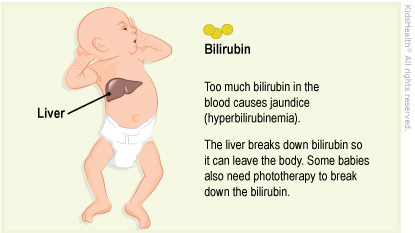Jaundice (JON-diss) is when the skin and whites of the eyes look yellow. It's caused by the buildup of bilirubin in the body. Bilirubin (bill-uh-ROO-bin) is a yellow substance made during the normal breakdown of red blood cells.
Mild jaundice in newborns usually gets better within 2 weeks without treatment. If jaundice gets worse or doesn't get better, treatment is needed to prevent serious medical problems.



Your baby:


Why do newborns get jaundice? Normally, bilirubin passes through the liver and then out of the body through poop. Sometimes newborns can't get rid of the bilirubin fast enough and it builds up in the body, causing jaundice. Premature (born early) babies are more likely to get jaundice than babies born on or near their due date. It can also take longer for jaundice to go away in a premature baby.
Other reasons that a baby might get jaundice include feeding problems, a reaction to breast milk, a genetic problem, or when the mother and baby have different blood types.
How is jaundice treated? Most babies with jaundice don't need treatment. If a baby's bilirubin level is very high or rising, treatment using a special type of light — called phototherapy — can be done at home or in the hospital. Phototherapy changes the bilirubin to a form that can easily pass from the body. Usually, phototherapy works for jaundice. But if a baby's jaundice keeps getting worse, even with phototherapy, health care providers will do more tests to look for another cause (such as an infection, a genetic condition, or another problem). They may also recommend a different treatment.